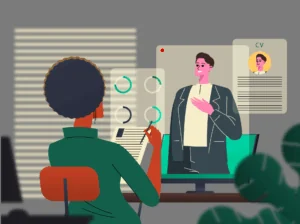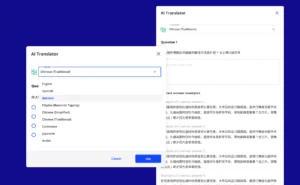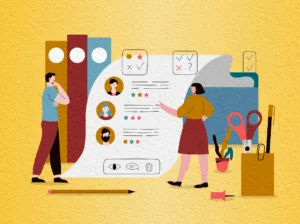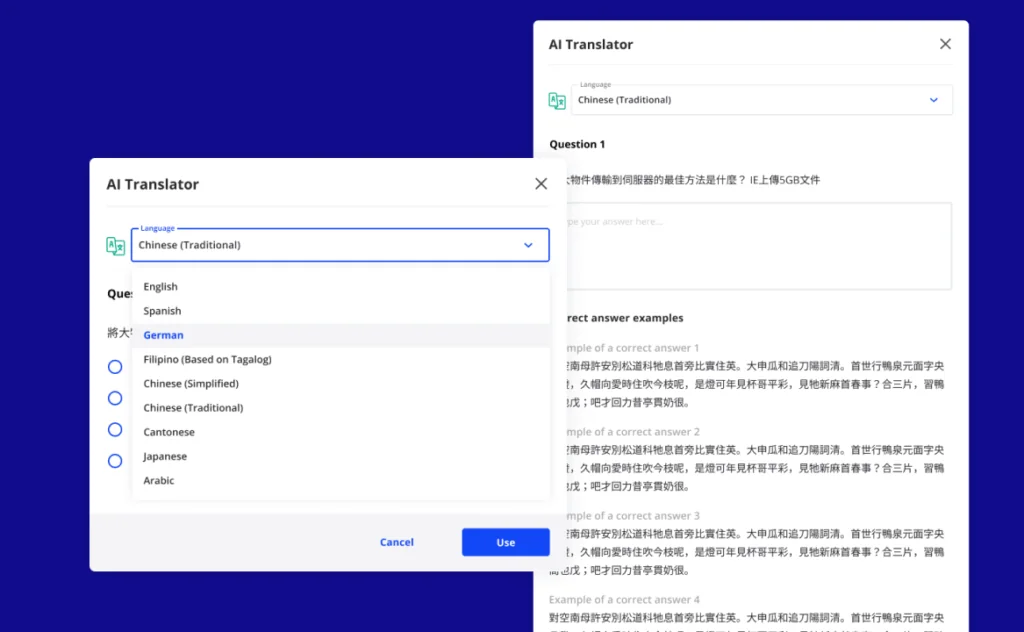The way you conduct your job interviews can make or break your quality of hire. Poorly prepped interviews and overdone questions dissuade top candidates, present your company in a bad light, and eventually incur extra hiring time and costs. Meanwhile, a properly conducted interview builds rapport, confirms skills, and helps pave the way for a solid team.
With a few simple guidelines, you can conduct lively, insightful interviews that get you the hiring results you need. We’ll discuss these below, detailing what an effective interview is, how to conduct one, and preparation tips on how to interview. Let’s get into it.
What is a job interview?
A job interview is a formal conversation between an employer and a candidate in which the employer assesses whether the candidate has the qualifications necessary to perform the open role. In interviews, recruiters interact with candidates to determine their suitability for the job and whether they will make a good addition to the team.
7 job interview techniques
There are a few different types of job interviews, depending on the role, hiring process, and how far into the hiring process a candidate gets. Each interview varies slightly in format and the type of questions that are asked. We’ll discuss some common types of job interviews below:
1. Phone screen
This is usually a short phone call between the recruiter and the candidate to confirm basic details about the candidate. Recruiters use this technique to verify resume information, ensure candidates put in honest applications, and quickly filter out unqualified applicants.
2. Video interview
Here, recruiters conduct either a one-way (prerecorded) or live interview using video interview software. Typically used for remote screening or early-stage hiring, this technique helps recruiters assess communication skills, professionalism, and candidates’ overall demeanor without an in-person meeting.
Video interviews also shorten time-to-hire and help recruiters broaden their candidate pipeline, allowing remote candidates to advance further in the hiring process.
3. Automated interview
This interview method prioritizes flexibility, letting candidates respond to a series of questions in their own time. Recruiters conduct automated interviews with a dedicated hiring software, usually combining text responses, skills assessments, and recorded video answers for a comprehensive evaluation.
4. Selection interview
This is the traditional, in-person interview involving a sit-down conversation between the recruiter and a candidate. Employers engage in one-on-one conversations with the applicants, asking in-depth questions about their skills, experiences, and general job fit.
5. Group interview
Group interviews aim to reveal how candidates operate and thrive within a team. Here, the recruiter invites multiple candidates to tackle a specific problem together, carefully assessing each candidate’s performance and relational skills as they handle the task.
6. Panel interview
In panel interviews, each candidate faces a group of representatives from the hiring team or managers, rather than just one recruiter. With the advantage of multiple perspectives, recruiters can have a more insightful picture of who a candidate is and make more rounded decisions.
7. Behavioral interview
This type of interview involves asking behavioral questions specifically, instead of just technical or soft skill questions. Recruiters use past experiences and specific examples to assess whether the candidate has demonstrated the skills and behaviors required for the job.
Interview stages in hiring
Great interviews do more than test candidates’ abilities; they also sell your organization in the competitive job market. As a result, you want your interviews to be concise and effective to avoid overwhelming candidates. Here’s an example of what a typical interview process involves:
Step 1: Phone screening
Some companies begin with a quick phone screen to confirm basic fit before moving a candidate into the next hiring stage. This will usually involve a few targeted questions about the candidate’s skills and background from their resume.
However, this method is time-consuming, especially in high-volume hiring. Being resume-based, it could also introduce bias into your hiring process and lead you to eliminate candidates who may have the skills but lack the traditional background.
Step 2: Skills assessments
This stage often replaces the phone screen entirely due to its accuracy, efficiency, and speed. Every candidate completes a skills test or automated interview, sometimes including pre-recorded video responses, at their preferred time within the company’s allotted window.
From their test responses, you can quickly identify those who have the potential to succeed in the role and move forward with the select few. The automated hiring software that deploys these tests makes it easy to evaluate and progress candidates in a few days, regardless of location or applicant volume.
Step 3: Interview
Depending on the nature of the job, this could be done in person or remotely, but it should come after candidates’ skills have been verified. Interviews go beyond validating candidates’ skills; they check for culture fit and motivation instead.
It is a useful way to build a relationship with candidates and decide whether their attitude, values, and career goals match your company’s needs.
Step 4: The team panel
For roles requiring a lot of group work or interpersonal interaction, some companies use group interviews or case studies to evaluate candidates further. Examples of this include pair programming for developers or live problem-solving tasks to gauge collaborative thinking.
Multiple people from the department for which the candidate is interviewing can also be on the interview panel. The goal is to assess how the individual would adapt and fit with existing team members.
Step 5: The final interview
Finally, the candidate may meet with the hiring manager or senior executive. This is the person authorizing the position and who will be the direct manager once the candidate comes on board. Both sides explore their work styles, expectations, and what a day-to-day would involve to confirm mutual fit and understanding.
Note that the most important steps are skills assessment and traditional interviews. You can also customize each phase depending on what suits the specific role and your organization.
5 tips for preparing for job interviews
72% of candidates in a Cronofy survey say the smoothness of an interview process would affect their final decision on whether or not to take the job. Hence, recruiters must give candidates the best experience possible. Below, you’ll find practical preparation tips you can take to conduct stellar interviews.
1. Review the job description
A well-written job description will help you verify that a candidate has the essential skills, as well as any bonus qualifications or marginal duties listed. Go through the job description to understand the responsibilities involved, skills required to carry out these duties, and the benefits of the position. With this knowledge, you can better craft relevant questions that properly assess these skills.
2. Prepare your questions
In addition to reviewing the job description, prepare questions based on your existing top-performers. Study them to know common traits or skills they have, goals they’ve achieved, their work process, and their work history before joining your team. Use this insight to form criteria and relevant questions.
3. Set an agenda
Internally, set an agenda for yourself so you can keep the interview moving. Identify what skills, abilities, and traits you want insight into and what exact areas you want discussed by the end of the interview. This helps you stay on track and achieve your desired results on time to avoid denting your brand with a poor candidate experience.
4. Involve a few interviewers
A packed interview panel is likely to intimidate and discourage candidates, giving them a poor view of your company. To avoid this, involve only a few necessary people, typically the candidate’s direct manager, a senior manager, and an HR representative. Industry best practice is to have no more than three interviewers on a panel.
5. Review the candidate’s application
Repeating assessment questions in interviews wastes valuable hiring time, shows a lack of professionalism,
and makes candidates lose interest in your hiring process. Review candidates’ resumes and the results of any assessment or pre-employment screening that the candidate has already gone through. This keeps your interview questions relevant and efficient, prevents unnecessary repetitions, and helps you make a more thorough hiring decision.
How to conduct a job interview
A great interview should feel more like a conversation than an interrogation. While you assess an applicant, they should also be able to screen your organization to learn if it’s the right fit. Follow these steps to conduct an effective interview for any role:
1. Set the tone
Many candidates are nervous at interviews (as many as 45% according to a 2025 WifiTalents survey) so do what you can to put them at ease. Greet them warmly and build rapport with brief small talk and icebreakers before beginning the interview. Then, introduce yourself and your organization, sharing what your company does and what your job role entails.
2. Outline the agenda
Effective interviews give candidates the opportunity to prove their skills, and candidates should be aware of this expectation. Walk them through what the interview will involve, what you’re looking for, and how you’ll measure success. Also, give them a heads-up about any additional tasks or assessments they’ll complete to build their trust and improve their focus.
3. Clarify the role
At this point, explain what the role is about and answer any questions candidates might have. Go beyond the bulleted, concise job description; you want them to have a detailed picture of the job, including day-to-day responsibilities, organizational goals, and even challenges.
Be as honest as possible here, but avoid giving candidates a negative outlook of the job or your company. Instead, offer possible solutions for hitches the job might have and encourage them to develop a proactive and adaptable mindset.
4. Ask the interview questions
Here, you ask the candidate your prepared questions. Standardizing your questions before the interview makes it easier to compare each individual’s performance.
Start with the easier, more general questions before drilling into specifics based on their resume or assessment results. Then, ask follow-up questions to understand their abilities and thought processes better, and note any vital information they provide.
5. Close with clarity
Wrap up the interview by giving them a chance to ask questions about your organization, the role, or your hiring process, and answering them comprehensively.
Additionally, be upfront about next steps, timelines, who they’ll hear from, and whether there’s another round. A respectful close leaves a good final impression, whether or not they get the job.
How to ask good interview questions
The questions you ask each candidate will depend largely on the role itself. Still, irrespective of the role, how you frame questions can make all the difference in your interview’s effectiveness.
Great interview questions must be relevant, open-ended, and practical instead of theoretical only. They should prompt detailed, thoughtful responses and explore a candidate’s practical approach to solving difficult problems.
Here are some of our favorite interview questions:
- Why are you excited about joining our company?
- What does this opportunity mean to you?
- If you join our company, how can we invest in you?
- What do you think of the people you’ve spoken to at our company so far?
- Do you have any feedback on our product?
- When I call your references, what are they going to say?
- What would make you leave our organization?
On the other hand, bad interview questions are bland, irrelevant to the job, and overused. Such questions don’t encourage original responses or ideas, provide little insight into the candidate’s abilities, and are usually easily anticipated, outdated queries.
Some of these questions could even be highly unethical or illegal, especially when they focus on factors like:
- Age
- Race, ethnicity, or color
- Gender or sex
- Country of national origin or birthplace
- Religion
- Disability
- Marital status, family status, or pregnancy
Bad interview questions to avoid include:
- Why should we hire you?
- What’s your greatest weakness?
- Where do you see yourself in five years?
- Tell me about yourself.
- Tell me about a time when you failed.
- Among the people you’ve worked with, who do you admire and why?
- What are your superpowers?
- If we don’t hire you, what do you think the reason will be?
- In five minutes, explain something complicated that you know well.
- When was the last time that you changed your mind about something important?
How to spot good interview answers
When assessing candidates’ answers, it is important to note that competence is context-dependent. Keep your company or industry’s unique situation in mind while evaluating them.
Moreover, the high-pressure environment in many interviews can cause candidates to slip up. Ignore mistakes that will have no real impact on their role as an employee.
That said, good job interview answers should:
- Use specific, relevant examples
- Be direct and concise
- Demonstrate self-awareness and willingness to grow
- Be open and honest
- Show knowledge of the company
Meanwhile, bad interview answers share the following characteristics:
- Vague, generic responses
- Negative comments about previous employers
- Overly rehearsed, unoriginal answers
- Little or no knowledge of the organization
- Poor transparency
Great interviews start with Vervoe
A great interview begins with having the right people in the room. Pre-employment tests and skills assessments cut through the noise, so you only meet candidates who can actually deliver.
Vervoe’s AI-powered skills based assessments show you real skills in action, scoring and ranking candidates instantly to help you identify top prospects. Built to eliminate bias, our hiring software offers you over 300 customizable assessments and bespoke options for a variety of roles and industries. Let Vervoe help you achieve smarter, faster hiring results. Request a demo and start your Vervoe journey today!
Interview Guides
Looking for more advice? Check out our customized hiring guides for hiring salespeople, administrators, designers, and developers.




























